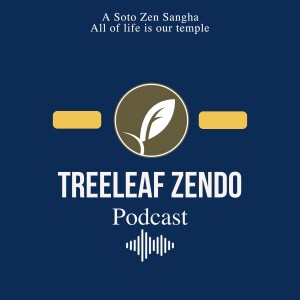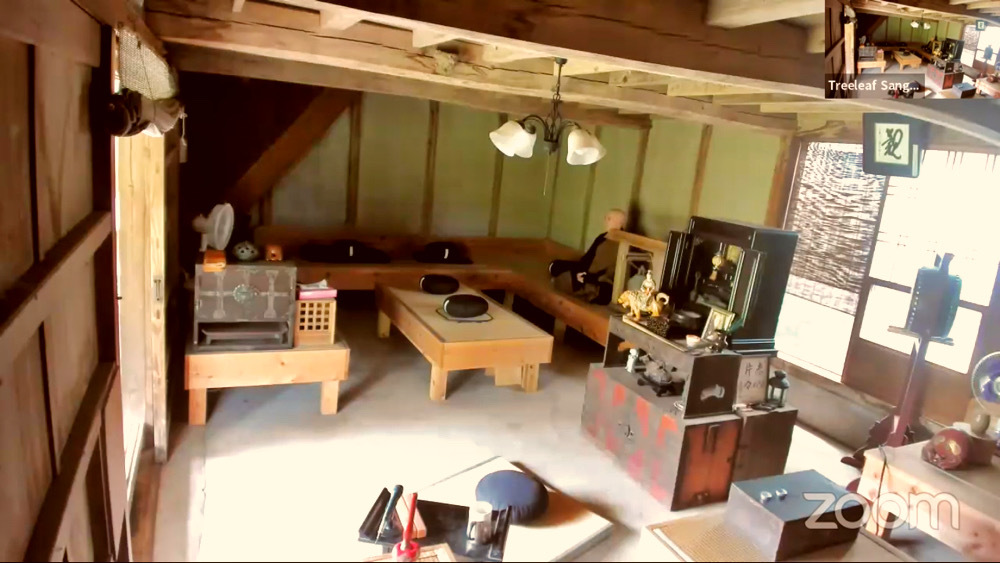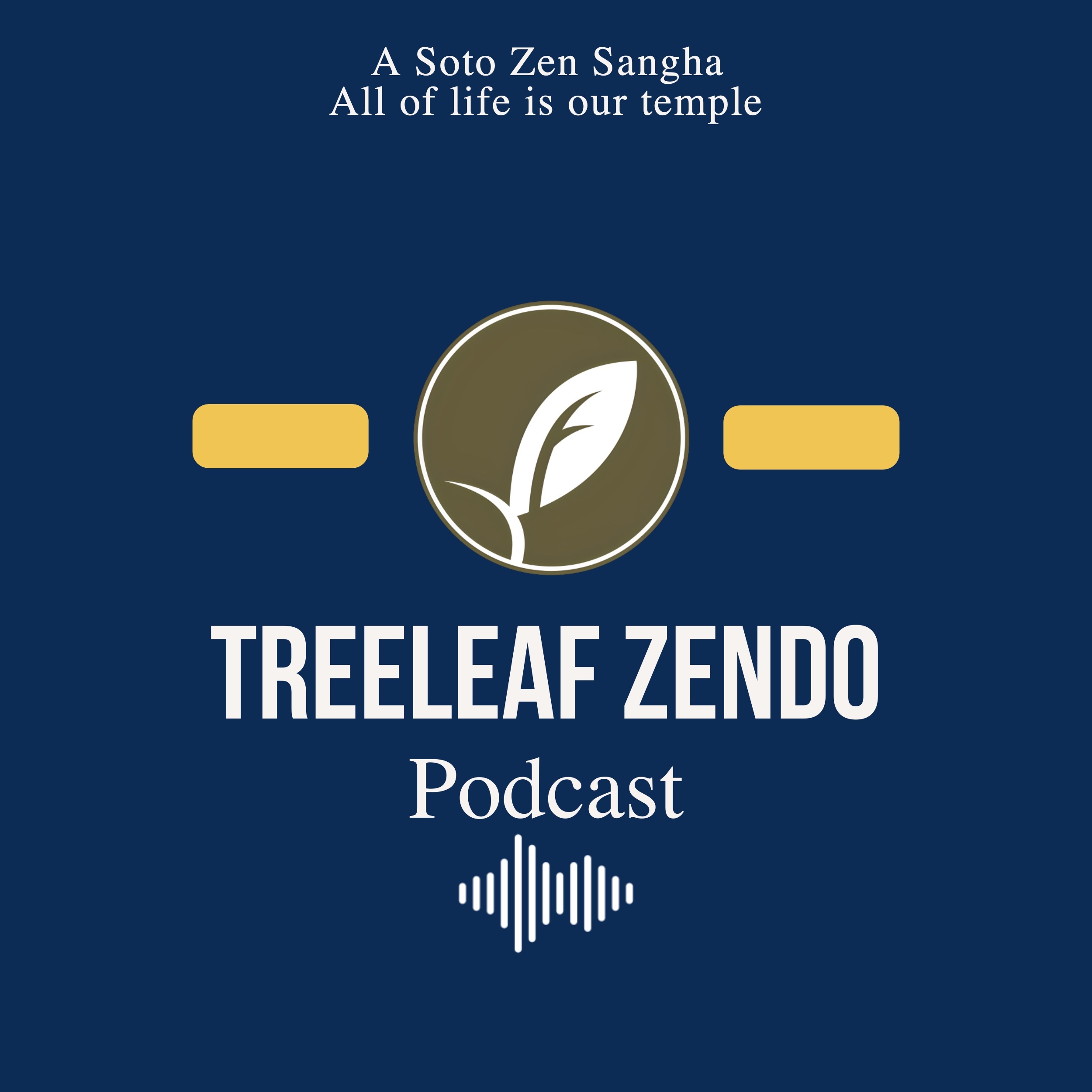Episodes
Episodes



Monday Apr 12, 2010
The Ten Oxherding Pictures (XIII)
Monday Apr 12, 2010
Monday Apr 12, 2010
Rev. Taigu closes his series on the Ten Oxherding Pictures…
“In the world, entering the marketplace… as we get up and leave our hermitage, we just don’t leave Shikantaza behind. If we do so, what would be the real meaning of our practice? Merging with people, being nobody, we disappear into the crowd. But we let the life of Shikantaza shine through and reveal the real face of this, every single sentient being is truly met and perceived. We don’t teach or instruct, but open our hands, our eyes and ears to the living teachings of the Buddhas which are found in every single form of this universe, from garbage to star. A very humbling experience, serving and being invisible. Our consciousness like clouds, rivers, wind, always passing, never fixed.”
(Click through for more, and to watch today’s talk and “sit-a-long.”)
Today’s Sit-A-Long video follows. Remember: recording ends soon after the beginning bells; a sitting time of 20 to 35 minutes is recommended.



Monday Apr 05, 2010
The Ten Oxherding Pictures (XII)
Monday Apr 05, 2010
Monday Apr 05, 2010
Rev. Taigu brings to life the 9th of the Ten Oxherding Pictures…
“Fabulous weather and great cherry blossoms. Loud and busy street, towers of steel and glass. We are reaching the source, or should we say that we are fully back to where we were originally? Anyway, the bull and the self have disappeared to fully merge with every single thing and being we meet. The ten thousand dharmas, the countless exixtences come forward. Seated in Buddha’s place, we are instantly actualizing Buddha.”
(Click through for more, and to watch today’s talk and “sit-a-long.”)
Today’s Sit-A-Long video follows. Remember: recording ends soon after the beginning bells; a sitting time of 20 to 35 minutes is recommended.



Monday Mar 29, 2010
The Ten Oxherding Pictures (XI)
Monday Mar 29, 2010
Monday Mar 29, 2010
For the 8th of the Ten Oxherding Pictures, Rev. Taigu offers this from Master Dogen’s Shobogenzo Genjo-Koan: To study the Buddha way is to study the self. To study the self is to forget the self. To forget the self is to be actualized by myriad things. When actualized by myriad things, your body and mind as well as well as the bodies and minds of others drop away. No trace of realization remains, and this no trace continues endlessly. “The place where everything is dropped, the action-non action of dropping things and self away, is what the 8th picture is about. All things go through that motion and dance, the dance of impermanence, forms have to go through that gateless gate where all reference points vanish to arise again. To truly and absolutely meet a tree, a flower, a friend, a sound, you have to go through the process where you forget totally anything about what is a tree, a flower, a friend or a sound. Otherwise, you would only meet dusty labels, names, memories, beliefs.”
“Dropping body-mind, forgetting the self is the roundness of the moon, this fully ripe moon which is also the true face of sitting. No trace of realization to be found there, for you are sitting as the very moonlight. The light doesn’t see itself. But indeed, the light is seen all around, endlessly shining in countless things.”



Wednesday Mar 24, 2010
The Ten Oxherding Pictures (X)
Wednesday Mar 24, 2010
Wednesday Mar 24, 2010
Rev. Taigu re-emerges with his next teaching on the Ten Oxherding Pictures. He writes:
“Once we drop whip and rope, once we stop manipulating reality, it appears by itself and we understand that we are exactly at the same spot as we were when it all started. The ox has and has not disappeared, it is now perfectly merged with this life as it comes and goes, nothing special to chase or ride anymore, just this very being here and now ringing in all directions. We have given up the search and in this calm and serene scenery we can dwell. This is, in essence, a non dualistic stage, neither one nor two, ox and self just as this.”



Monday Mar 15, 2010
The Ten Oxherding Pictures (IX)
Monday Mar 15, 2010
Monday Mar 15, 2010
Rev. Taigu again takes us for a ride with the next of the Ten Oxherding Pictures. He writes:
“Riding the bull home… As one mounts the bull, rides the bull, the world and practice itself are not experienced as obstacles anymore. The bull as an object to grasp, a goal to reach has disappeared. Practice and self are intimate. In this, carefreeness, detachment, joy arise from the silence space of sitting. The boy is not worried anymore about where he should go, where the bull takes him to, what the Bull-boy will become. As the comment sates: this struggle is over; gain and loss are assimilated. The song of the flute is played by ten thousand things met and released. Forms and sounds play and are played. This dance is nothing but the Bodhisattva stepping into the world, freely playing with what comes and goes, fully interacting with things and beings without being caught by any…”



Monday Mar 08, 2010
The Ten Oxherding Pictures (VIII)
Monday Mar 08, 2010
Monday Mar 08, 2010
Rev. Taigu again take the reigns to lead us through the next of the Ten Oxherding Pictures. He writes:
“Taming the bull is the story of discipline. One has to take the lead and establish a regular and steady practice. That is, at least, the traditional reading of this image. I would like to come forward with something very different: taming the bull can also be giving a specific direction to sitting, having goals and aims, and therefore we loose the original freedom of practice trying to make it fit our plans.”



Monday Mar 01, 2010
The Ten Oxherding Pictures (VII)
Monday Mar 01, 2010
Monday Mar 01, 2010
Rev. Taigu continues his series of talks on the Ten Oxherding Pictures. He writes:
Getting hold of the tail is the moment were we may think we have got it. The gesture is firm, the grasp strong and the will to tame the ox very much alive. If we stay there, we may think with pride that the journey is over and that our understanding is stronger than anybody else’s. A lot of arrogance coupled with struggle are yet noticeable, the attitude is stiff and the sitting rigid as well as the views, the many views we have about things and people. We are drunk with views and opinions, intoxicated with ideas and judgments. This kind of attitude and the state of body-mind characterized by this picture can be seen on various blogs and forums over the internet where people, hidden behind the anonymity and safe veil of their computer screens throw abusive language and display violence, lies, all sorts of judgments being made about people and situations they know nothing or very little about. Internet magnifies the imperfections and problems. You may have a look at how this teenage zen (teenage Zen, because self-infatuation and violence hiding a very poor self image is precisely one of the main problems of adolescence) creeps on line. It also curses our blood. We have to pay attention and come back to not knowing. It is so tempting to freeze every living experience into an asset, something to treasure, to own.



Monday Dec 21, 2009
The Ten Oxherding Pictures (VI)
Monday Dec 21, 2009
Monday Dec 21, 2009
Continuing our glimpse at ...
... catching a glimpse, the watcher
(After a lovely year here at Beliefnet.com, our daily "Sit-a-long with Jundo" Zazen netcasts will be moving home on January 1st to SHAMBHALA SUNSPACE, the webpage of the Shambhala Sun and Buddhadharma magazines, where we will be a daily featured Buddhist blog ... sitting there just as we do here. )

Welcome to Treeleaf Sangha
Treeleaf Zendo is an all-digital practice place for Zen practitioners who cannot easily commute to a Zen Center due to health concerns, living in remote areas, or childcare, work and family needs, and seeks to provide Zazen sittings, retreats, discussion, interaction with a teacher, and all other activities of a Soto Zen Buddhist Sangha.
Available for you any time, all fully online.




